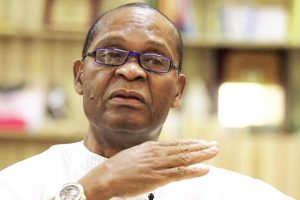
Doyin Okupe, former spokesperson and ex-Director-General of Peter Obi’s Presidential Campaign Organisation, has expressed strong reservations about the North assuming power in 2027.
He emphasized that geopolitical fairness demands that the South should produce Nigeria’s next president.
Speaking with journalists on Thursday, Okupe argued that political balance necessitates a continuation of the North-South power rotation, particularly since the South would have only completed one term under President Bola Ahmed Tinubu by 2027.
Atiku’s Prospects and Challenges
While acknowledging the qualifications of Alhaji Atiku Abubakar, the 2023 presidential candidate of the Peoples Democratic Party (PDP), Okupe said Atiku’s candidacy would face the same geopolitical challenges that hindered him in 2023.
“Atiku failed in 2023, not because he lacked competence or vision, but because the electorate felt it was inappropriate for a northern Muslim to succeed another northern Muslim after eight years under Muhammadu Buhari,” Okupe explained.
The former presidential aide pointed out that this perception of disrupting the power rotation between the North and South played a significant role in Atiku’s loss.
“If Atiku contests in 2027, he is fully within his rights. He is one of the most qualified and experienced candidates Nigeria has. However, the challenge remains geopolitical. The South deserves to complete its eight-year cycle, just as the North did before Tinubu’s presidency,” Okupe stated.
Geopolitical Fairness Over Constitutional Mandates
Okupe acknowledged that the power rotation arrangement is not enshrined in the Nigerian constitution but argued that it is a widely accepted political convention designed to promote unity and inclusivity.
“It’s not in the constitution, but we have an understanding that after eight years of northern leadership, the South should have its turn. Allowing the North to cut short the South’s tenure in 2027 would violate this principle and cause further divisions,” Okupe said.
He added, “Geopolitical considerations must guide us. A Northerner has completed eight years. A Southerner needs to complete their tenure. It’s a matter of equity and balance, not personal ambition.”
Implications for 2027
Okupe’s remarks reflect growing debates about the direction of Nigeria’s leadership after Tinubu’s tenure. With the South just halfway through its term by 2027, many analysts and political stakeholders share Okupe’s view that the presidency should remain in the South for another four years.
As political parties gear up for the next general elections, these discussions will likely shape campaign strategies and alliances. Okupe’s comments serve as a reminder of the delicate balance required to maintain national cohesion in Nigeria’s diverse and politically charged landscape.





